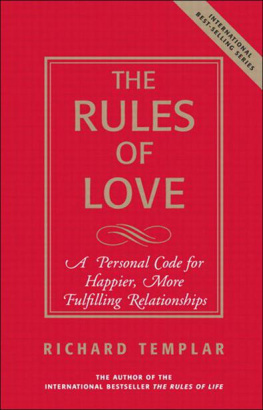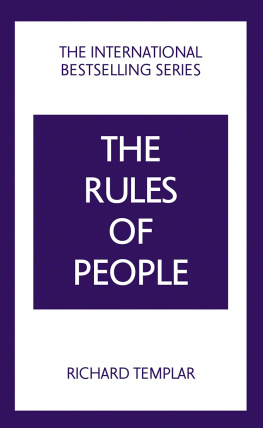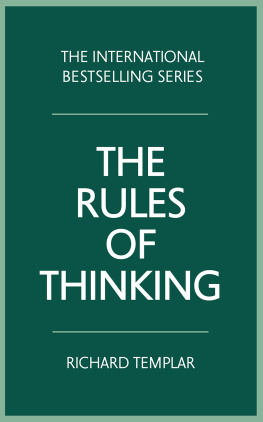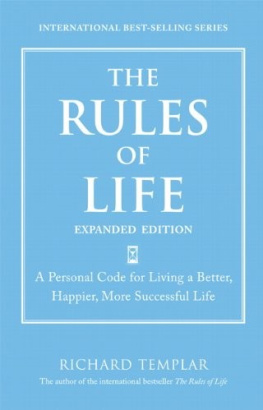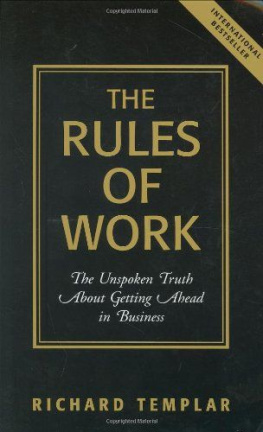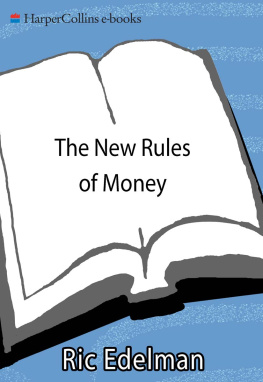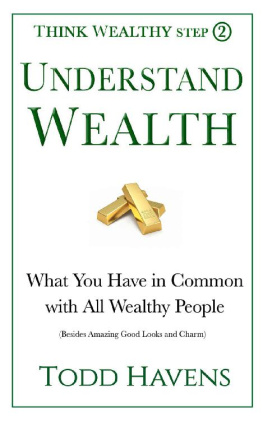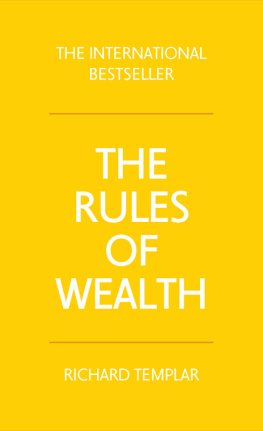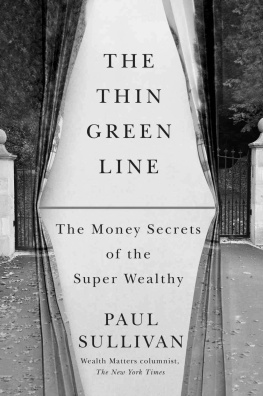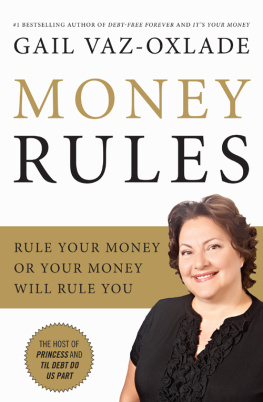The Rules of Money: How to Make It and How to Hold on to It
Expanded Edition
Richard Templar
Vice President, Publisher: Tim Moore
Associate Publisher and Director of Marketing: Amy Neidlinger
Acquisitions Editor: Megan Graue
Operations Specialist: Jodi Kemper
Senior Marketing Manager: Julie Phifer
Assistant Marketing Manager: Megan Graue
Cover Designer: Alan Clements
Managing Editor: Kristy Hart
Senior Project Editor: Lori Lyons
Proofreader: Apostrophe Editing Services
Senior Compositor: Gloria Schurick
Manufacturing Buyer: Dan Uhrig
2012 by Pearson Education, Inc.
Publishing as FT Press
Upper Saddle River, New Jersey 07458
Authorized adaptation from the original UK edition, entitled The Rules of Wealth, Second Edition, by Richard Templar, published by Pearson Education Limited, Pearson Education 2012.
This U.S. adaptation is published by Pearson Education, Inc.,
2012 by arrangement with Pearson Education Ltd, United Kingdom.
FT Press offers excellent discounts on this book when ordered in quantity for bulk purchases or special sales. For more information, please contact U.S. Corporate and Government Sales, 1-800-382-3419, .
Company and product names mentioned herein are the trademarks or registered trademarks of their respective owners.
All rights reserved. No part of this book may be reproduced, in any form or by any means, without permission in writing from the publisher.
Rights are restricted to U.S., its dependencies, and the Philippines.
Printed in the United States of America
First Printing January 2012
ISBN-10: 0-13-290781-X
ISBN-13: 978-0-13-290781-1
Pearson Education LTD.
Pearson Education Australia PTY, Limited.
Pearson Education Singapore, Pte. Ltd.
Pearson Education Asia, Ltd.
Pearson Education Canada, Ltd.
Pearson Educacin de Mexico, S.A. de C.V.
Pearson EducationJapan
Pearson Education Malaysia, Pte. Ltd.
The Library of Congress Cataloging-in-Publication Data
Templar, Richard, 1950-2006.
The rules of money : how to make it and how to hold on to it / Richard Templar. -
Expanded ed.
p. cm.
ISBN 978-0-13-290781-1 (pbk. : alk. paper)
1. Wealth. 2. Finance, Personal. 3. Money. 4. Success. I. Title.
HC110.W4T46 2012
332.024--dc23
2011045649
Acknowledgments
I would like to thank Dan Clayden, director of Clayden AssociatesIndependent Financial Advisers (www.claydenassociates.co.uk) who was so kind as to go through a draft of this book in the early stages and put me right on a few things and is one of the best financial advisers I have ever met professionally.
I would also like to dedicate this book to my delightful father-in-law who manages his money in a kind, generous, honest and moral way and still manages to make it work for him efficiently and expertly. He is an example to all of us. He is a Rules Player par excellence.
Introduction
Theres an old saying Money, money, moneyits all they can think about. Unlikely to be true of course, given that hardly anybody thinks about money itself (unless they happen to be a coin collector). The reason we all pursue and desire and fiercely protect money is because of what we can do with it.
And no, of course money cant buy you love or happiness. Although it can buy a good deal of pleasureand remove a lot of unhappiness. But it can buy you plenty of other things. Over the years Ive identified the ten things which people most seem to want to spend their money on:
1 Security: A home of your own and enough money in the bank to support you in the way you want, plus a bit in hand for emergencies, and a big enough pension to ensure a comfortable retirement.
2 Comfort: A warm and spacious house, a big car, someone to clean or mow the lawns or do the laundry or mind the kids, and good quality medical care whenever you want it.
3 Luxuries: Exotic vacationss, fine wines, meals at top-class restaurants, expensive clothes, the best seats at sports events or opera or whatever you enjoy.
4 Mobility: First-class train seats and plane tickets, trips on cruise ships, chauffeur-driven cars wherever you are in the world.
5 Status: Prestigious invitations, access to important people and exclusive clubs, and perhaps even gratifying deference from others.
6 Influence: As a generous donor of substantial sums, you can make sure that your views and wishes are listened to and taken seriously.
7 Freedom: Not being dependent on employers, bosses, creditors, clients, customers. Not being a slave to the calendar, diary, or clock. Knowing you wont have to be a burden on your children.
8 Leisure: Time to do the things you want, go where you want, meet who you want, when you want.
9 Popularity: Being able to entertain friends, acquaintances, and contacts frequently and generously does wonders for your social life.
10 Philanthropy: Being able to make regular and substantial donations gives you the satisfaction of helping people, supporting organizations, and furthering causes you believe in.
Seems a reasonable enough list to me. And whether its some or all those things that youd like more of, you need to know how to go about generating greater wealthwhich means you need to know what it is that separates the wealthy from the not-so-wealthy. So, what you need to know is what principles, and what behaviors the rich have, that you dont (yet). Some of them you will realize that you know, but dont do. None of this is actually rocket science; its about understanding and then doing. Ive studied a lot of wealthy people, and its clear to me that there are some fundamental common principles followed by almost all. The bulk of the Rules in this book fall into that category. Then there are also some principles which some rich people swear by, but not all. Ive included some of those too for good measure, just in case you too are one of the people they do the trick for.
Security, comfort, luxuries, mobility, status, influence, freedom, leisure, popularity, philanthropythats all some people think about. They may not be everything; they may not even guarantee a happy life, but theyre a pretty good basis to build happiness on.
Ive tried to set out in this book the most important Rules that can help you achieve these ten things. All of them purport to be about accumulating money, and of course in a sense they are, but at heart theyre about money only as a means to an end. A means to achieve those ten ends.
Of course I dont claim that these hundred or so Rules are the only means to these particular ends. You may encounter others along the way that you find helpful. If so, please do feel free to share them. You can email me at .
Richard Templar
Part I. Thinking Wealthy
Money is a concept. You cant really see or touch it (unless you are holding a gold bar in your hand). You can only do that with some physical symbol of it like stock certificates or a check. Bits of paper, yes, but bits of paper with enormous power.
The concept of money comes with a lot of baggage to most of us. We have an inherent belief that it is good or bad and that wanting it is good or bad. That loving it is good or bad. That spending it is good or bad.
What I am going to suggest in the first few Rules is that maybe, just maybe, how we think about wealth might be holding us back from having wealth. If, in our heart, we believe (even subconsciously) that money is a bad thing and having lots and lots of it is a really bad thing, then chances are we might be undermining our own efforts, unwittingly, to get lots of it.


